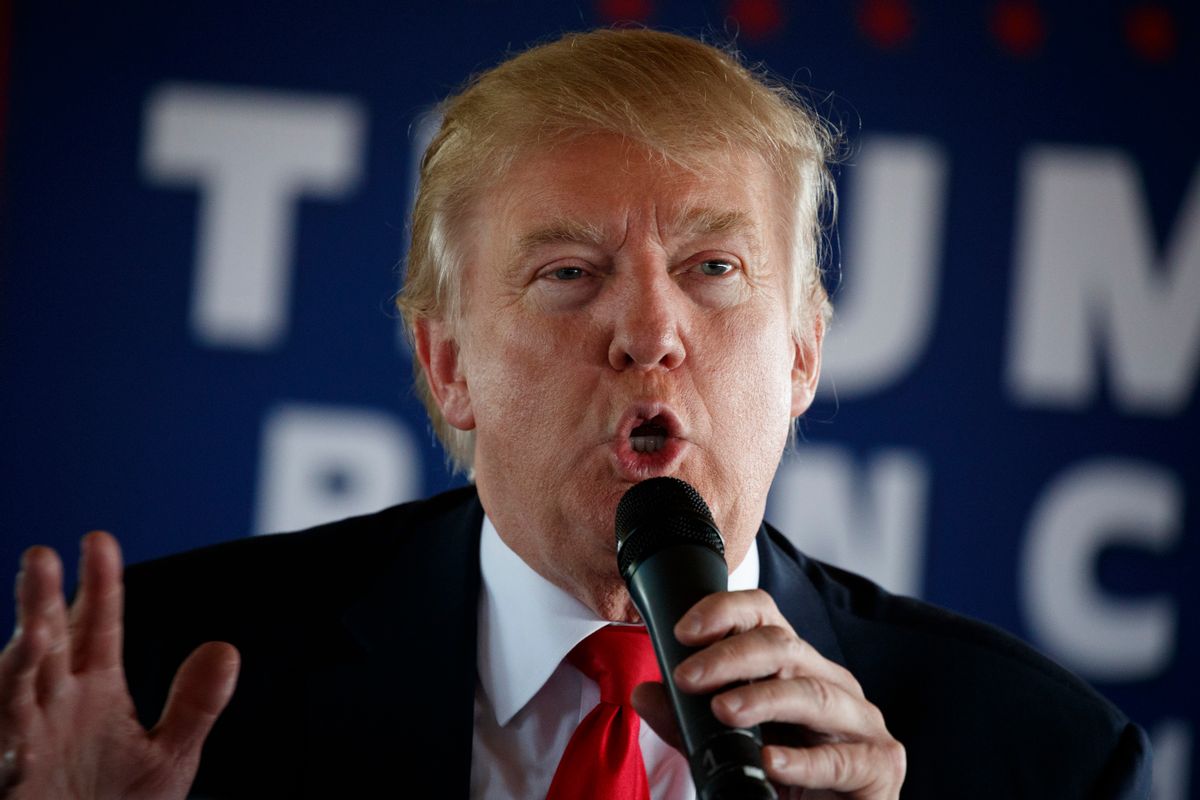This article originally appeared on AlterNet.
When this campaign is over, let's not forget Donald Trump's steady use of anti-Semitic stereotypes and images throughout the campaign—ideas we can expect he'll continue to use when the election is over and he tries to re-invent himself as the leader of a white supremacist nationalist movement and the public face of a new media empire (Trump TV?) with his supporters Roger Ailes (former head of Fox News who has a history of making anti-Semitic comments and was responsible for Fox News' anti-Semitic crusade against the phony "war on Christmas"), Stephen Bannon (head of Breitbart News known for his own anti-Semitic remarks), and hedge fund billionaire Robert Mercer (the money behind Breitbart News).
Trump's anti-Semitism comes in different shapes and sizes. He verbalizes it, encourages it, enables it, tolerates it, and makes excuses for it. What he doesn't do is condemn it.
Trump's most recent anti-Semitic remarks were in a speech, and a tweet, last week that included this line: "Hillary Clinton meets in secret with international banks to plot the destruction of U.S. sovereignty in order to enrich these global financial powers, her special interest friends and her donors." Trump didn't need to use the word "Jew." The imagery of a global banking cabal will be familiar to anyone who has read The Protocols of the Elders of Zion, the anti-Semitic forgery that has fueled anti-Jewish violence for over a century. These are well-known anti-Semitic code words. The speech, typical of Trump's paranoid conspiracy theories, was designed to fire up Trump's white nationalist, anti-Semitic base.
Trump's chronic anti-Semitism is often overlooked when reporters and others itemize the long laundry list of the GOP candidate's bigotry and offensive comments, including sexism, racism, and insults directed toward Muslims and the physically disabled. Trump has often retweeted messages from white supremacists and anti-Semites, including the image of Clinton with a Jewish star and $100 bills in the background and the headline "Most Corrupt Candidate Ever."
In response to Trump's repeated claim about the election being rigged, the popular right-wing site Daily Stormer wrote that "People aren't going to quietly go home if the Jews steal this election from us." Other sites supporting Trump have posted similar slurs.
Anti-Semitic comments on social media have skyrocketed, because Trump is bringing these ugly stereotypes, once relegated to the lunatic fringe of the internet, into the mainstream. A new Anti-Defamation League uncovered more than 2.6 million tweets with anti-Semitic comments and images between August 2015 and July 2016, a huge upsurge from the previous year. Many of them identified themselves as Trump supporters or Clinton haters, and many (including death threats) were directed at Jewish journalists who had been critical of Trump.
Trump's comment about Clinton's ties to an international banking conspiracy was not an offhand remark. He has a history of making anti-Semitic remarks, including this comment in a speech during this campaign to the Republican Jewish Coalition (a tiny group): "I know why you're not going to support me. You're not going to support me because I don't want your money ...Look, I'm a negotiator like you folks, we're negotiators."
In an interview where he was asked if he'd read any of Hitler's speeches, Trump said: "If I had these speeches, and I am not saying that I do, I would never read them... My friend Marty Davis from Paramount gave me a copy of Mein Kampf, and he's a Jew." (Davis is not Jewish.)
Trump's frequent references at his rallies and during the debates to Sidney Blumenthal, George Soros and Debbie Wasserman-Schultz—Jewish supporters of Hillary Clinton—is no accident. This is not random name-dropping; these are dog whistles aimed at his racist and anti-Semitic supporters.
He once tweeted: "I promise you that I'm much smarter than Jonathan Leibowitz—I mean Jon Stewart @TheDailyShow. Who, by the way, is totally overrated." While Stewart has often referred to himself as Jewish, only an anti-Semite would refer to Stewart's Jewish-sounding real name in this way.
Earlier this year Trump initially refused to condemn and reject support from former Ku Klux Klan leader David Duke, the well-known racist and anti-Semite.
One of Trump's foreign policy advisers, Joseph Schmitz, is accused of bragging that he pushed out Jewish employees when he was Defense Department inspector general a decade ago. He also made comments denying the magnitude of the Holocaust.
When accused of fostering anti-Semitism, Trump often reminds people that his daughter Ivanka is married to a Jew (Jared Kushner) and converted to Judaism. But even members of Kushner's family have expressed their concern about his excuses for Trump's ugly remarks.
In most presidential election over the past 50 years, about 70-80 percent of Jews typically vote for the Democratic candidate, higher than any demographic group except African Americans. Don't be surprised if this year 85-90% of Jews vote for Hillary Clinton.
The likely uptick in Jewish voting for this year's Democratic candidate is due as much to Jews' overall liberal views on abortion and women's rights, environmental and economic policy, and opposition to Trump's ugly comments about Muslims and others than to their concerns about his repugant anti-Semitism. But Trump's anti-Semitic remarks surely compounded their opposition to the Republican demagogue.
House Speaker Paul Ryan and Senate Majority Leader Mitch McConnell initially ignored Trump's anti-Hillary Jewish star tweet last July until they were embarrassed into denouncing it. But most Republican leaders have not condemned Trump's persistent anti-Semitism or the upsurge of Jew hatred he has encouraged.
A handful of Jews still support Trump, including Steve Mnuchin, who is a Wall Street banker and hedge fund billionaire as well as Trump's finance chair, and Sheldon Adelson, a billionaire casino owner and GOP mega-donor whose newspaper, the Las Vegas Review Journal endorsed Trump this week. When will they come to their senses?



Shares